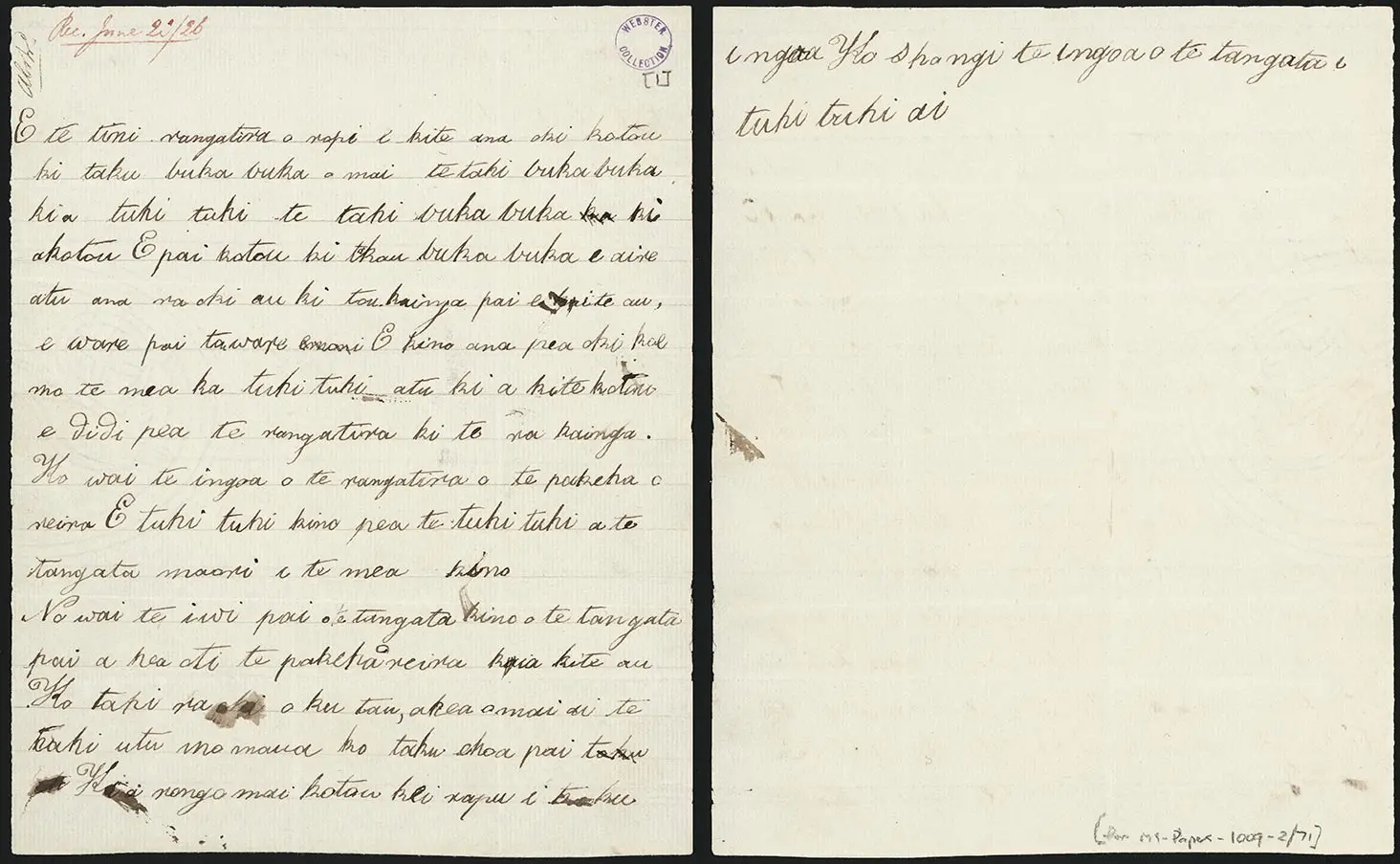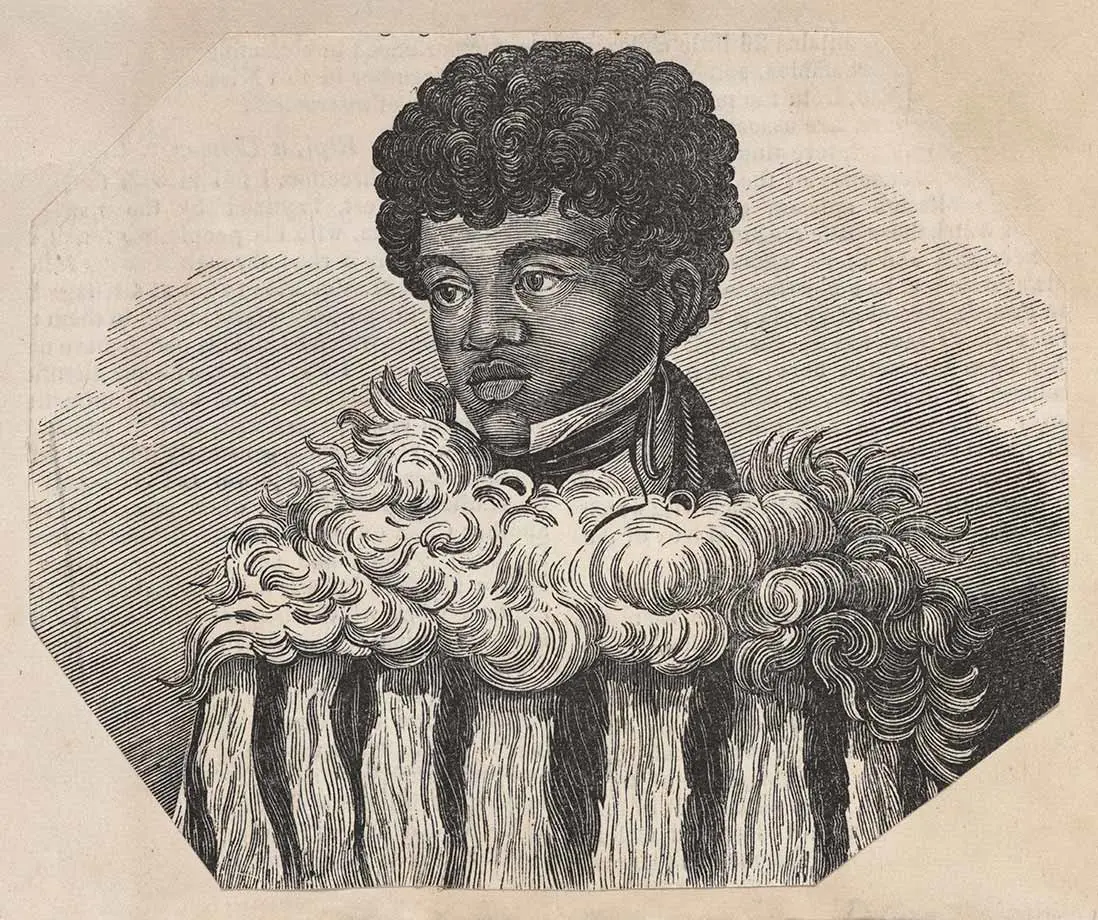Image credit: Letter written to Church Missionary Society leaders by a 10-year-old pupil at the CMS school, Kerikeri, 1825. Ref: MS-Papers-1009-2/71-01 Alexander Turnbull Library.

Image credit: Letter written to Church Missionary Society leaders by a 10-year-old pupil at the CMS school, Kerikeri, 1825. Ref: MS-Papers-1009-2/71-01 Alexander Turnbull Library.

This letter, written by Eruera Pare Hongi, may be the earliest known letter written in te reo Māori. Read about Eruera and the important documents he scribed, including He Whakaputanga. Find out more by exploring our collections and curated resources.
The Christian missionaries who came to Aotearoa New Zealand opted to bring the message of their faith to Māori in te reo Māori. For this, they relied on Māori not only to learn the language for oral communication, but also to create its written form via grammar books and dictionaries to produce Christian reading materials. In the process, the new technologies of reading and writing were seized on with enthusiasm by Māori, including Eruera Pare Hongi (Edward Parry Hongi) (Ngāpuhi, Ngāi Tawake; c. 1815–1836).
Hongi, a relative of the Ngāpuhi chief Hongi Hika, excelled at the Church Missionary Society (CMS) school in Kerikeri — the CMS’s second European settlement, established in 1819. This letter, written when Hongi was about 10, is addressed to the CMS leaders in England and was sent to them by his teacher, George Clarke, as a sample of his top students’ work, ‘quite masters of reading and writing’.
In his letter, Hongi asks for writing paper and an invitation to travel to England. According to historians Alison Jones and Kuni Kaa Jenkins, he also ‘wished to know the names and dispositions of the chiefs in Europe; and he wanted to find out more about how Europeans decide who are the ‘good’ and ‘bad’ people. He had also hoped for some reward for his letter.’ For them, Hongi’s letter marks the end of the beginning of Māori engagement with writing, which by the late 1820s was established as a popular pastime in the Bay of Islands.
Hongi became the most prominent scribe of the 1830s, and signed as witness to a number of land deeds in Northland. He worked closely with the missionaries, particularly William Yate, who arrived in 1828 and baptised Hongi in 1831. The men collaborated on the Māori translation of scriptures for printing in Sydney, which Hongi visited several times.
Hongi also wrote the Māori text for the 1831 petition to King William IV, written by Yate for 13 rangatira who were concerned about a possible takeover by the French. Yate, described as a constant companion of Hongi’s, was dismissed from the CMS because of his relationships with men. Although Hongi is said to have married in 1833 or 1834, it is likely that he was also Yate’s lover.
Hongi was the scribe for the Māori text of the 1835 Declaration of Independence, He Whakaputanga, which Ngāpuhi scholars believe he also helped to draft. With his early death in 1836, we can only imagine what contribution he might have made to drafting the Treaty of Waitangi.
Story written by: Paul Diamond
Copyright: Turnbull Endowment Trust
Image credit: Portrait of Eruera Pare Hongi, ‘a baptized New Zealand youth’, 1830s. Artist unknown. Ref: E-296-q-180-2 Alexander Turnbull Library.

Explore the National Library website and Alexander Turnbull Library collections further:
Topic Explorer has:
Many Answers has Declaration of Independence (New Zealand).
Want to share, print or reuse one of our images? Read the guidelines for reusing Alexander Turnbull Library images.
Tikanga ā-iwi:
Te whakaritenga pāpori me te ahurea
Te ao hurihuri.
Te Takanga o Te Wā (ngā hītori o Aotearoa):
Whakapapa
Mana motuhake.
Social sciences concepts:
Identity, culture, and organisation
Continuity and change.
Aotearoa New Zealand’s histories:
Māori history is continuous
Colonisation and its consequences
The exercise of power
Relationships and connections between people.